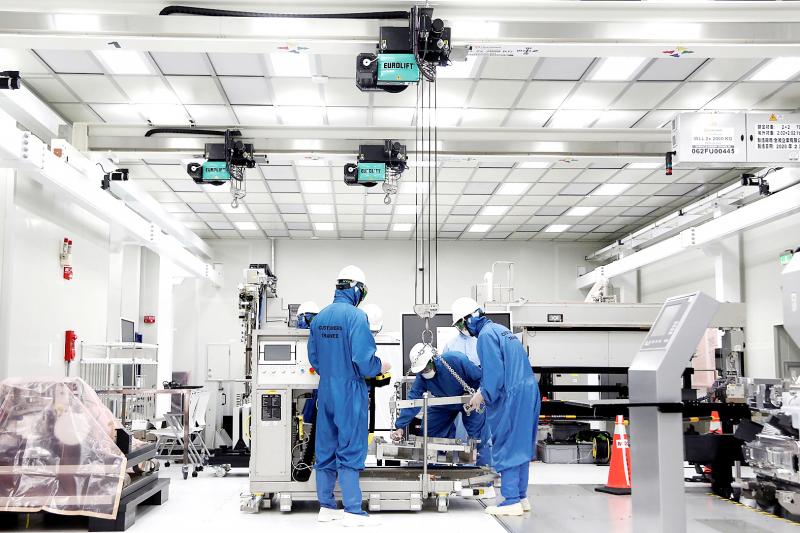Dutch semiconductor equipment maker ASML Holding NV yesterday launched a global EUV (extreme ultraviolet) training center in Tainan to get closer to its customers.
The center features live EUV machine modules and comprehensive training courses to train EUV engineers to cater to customers in Asia, ASML said in a statement.
EUV lithography uses “soft X-ray” light with a wavelength of just 13.5 nanometers to create extremely fine features in silicon and is currently used in the production of 7-nanometer and 5-nanometer chips by Taiwan Semiconductor Manufacturing Co (TSMC, 台積電).

Photo: Ann Wang, Reuters
The center at the South Taiwan Science Park has 14 international trainers and would be able to develop 360 EUV engineers every year.
ASML invested 13.5 million euros (US$15.95 million) over the past two years to set up the 1,625m2 facility.
The center will help ASML support their customers by training engineers locally instead of at its other training centers in the Netherlands, South Korea or the US, the statement said.
“By placing our Global EUV Technology Training Center in Asia where EUV systems will continue to be installed, we expect to achieve significant savings in both time and money to bring EUV knowledge to those who need it,” Wayne Allan, executive vice president of ASML Global Customer Support, said in the statement.
“ASML is growing with the semiconductor industry and our customers,” the statement said.
In 2010, ASML shipped the first prototype EUV lithography system to TSMC for research and development purposes, marking the beginning of a new era in lithography, it said.
In 2017, the company shipped the first production-ready system, the TWINSCAN NXE:3400, to TSMC, it said.
Three years later, Taiwan has become home to the world’s largest EUV installed base, the company added.

With an approval rating of just two percent, Peruvian President Dina Boluarte might be the world’s most unpopular leader, according to pollsters. Protests greeted her rise to power 29 months ago, and have marked her entire term — joined by assorted scandals, investigations, controversies and a surge in gang violence. The 63-year-old is the target of a dozen probes, including for her alleged failure to declare gifts of luxury jewels and watches, a scandal inevitably dubbed “Rolexgate.” She is also under the microscope for a two-week undeclared absence for nose surgery — which she insists was medical, not cosmetic — and is

CAUTIOUS RECOVERY: While the manufacturing sector returned to growth amid the US-China trade truce, firms remain wary as uncertainty clouds the outlook, the CIER said The local manufacturing sector returned to expansion last month, as the official purchasing managers’ index (PMI) rose 2.1 points to 51.0, driven by a temporary easing in US-China trade tensions, the Chung-Hua Institution for Economic Research (CIER, 中華經濟研究院) said yesterday. The PMI gauges the health of the manufacturing industry, with readings above 50 indicating expansion and those below 50 signaling contraction. “Firms are not as pessimistic as they were in April, but they remain far from optimistic,” CIER president Lien Hsien-ming (連賢明) said at a news conference. The full impact of US tariff decisions is unlikely to become clear until later this month

GROWING CONCERN: Some senior Trump administration officials opposed the UAE expansion over fears that another TSMC project could jeopardize its US investment Taiwan Semiconductor Manufacturing Co (TSMC, 台積電) is evaluating building an advanced production facility in the United Arab Emirates (UAE) and has discussed the possibility with officials in US President Donald Trump’s administration, people familiar with the matter said, in a potentially major bet on the Middle East that would only come to fruition with Washington’s approval. The company has had multiple meetings in the past few months with US Special Envoy to the Middle East Steve Witkoff and officials from MGX, an influential investment vehicle overseen by the UAE president’s brother, the people said. The conversations are a continuation of talks that

CHIP DUTIES: TSMC said it voiced its concerns to Washington about tariffs, telling the US commerce department that it wants ‘fair treatment’ to protect its competitiveness Taiwan Semiconductor Manufacturing Co (TSMC, 台積電) yesterday reiterated robust business prospects for this year as strong artificial intelligence (AI) chip demand from Nvidia Corp and other customers would absorb the impacts of US tariffs. “The impact of tariffs would be indirect, as the custom tax is the importers’ responsibility, not the exporters,” TSMC chairman and chief executive officer C.C. Wei (魏哲家) said at the chipmaker’s annual shareholders’ meeting in Hsinchu City. TSMC’s business could be affected if people become reluctant to buy electronics due to inflated prices, Wei said. In addition, the chipmaker has voiced its concern to the US Department of Commerce